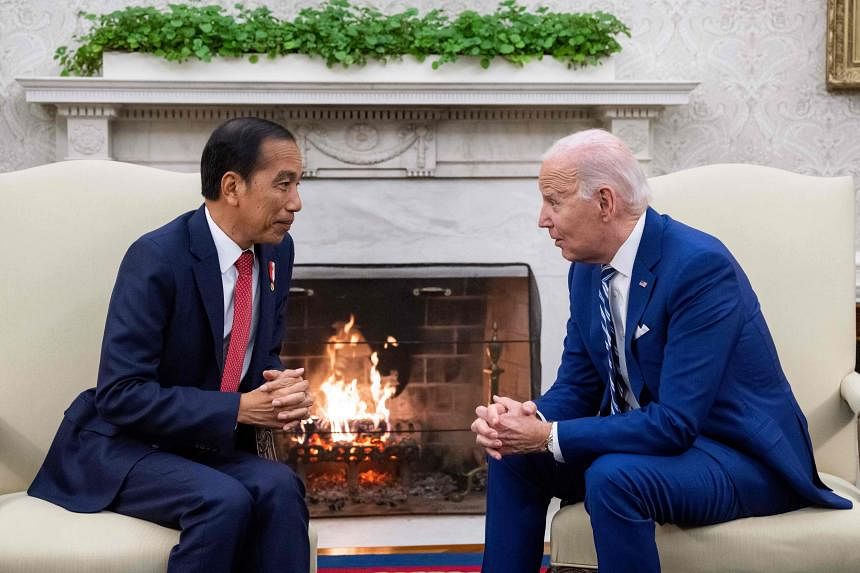WASHINGTON/JAKARTA - Indonesia and the United States have elevated their relationship to a Comprehensive Strategic Partnership, following a bilateral meeting on Monday between President Joe Biden and his Indonesian counterpart, Mr Joko Widodo.
The elevation marks a new level in a relationship that has at times been touchy, with concerns among some US senators over labour rights and environmental standards in Indonesia.
However, with the US keen on diversifying its supply chains to reduce its reliance on China, and also to secure supplies of critical minerals needed for its energy transition, and Indonesia concerned about its maritime territory in the face of increasing assertiveness by China in the South China Sea, the two countries are finding new common ground.
They pledged cooperation across a range of areas, including diversification of supply chains, development of Indonesia’s semiconductor industry, and cooperation on defence – which will see more frequent meetings between senior defence officials on both sides.
“This will mark a new era… across the board, affecting everything,” President Biden said at the outset of their meeting.
“It includes enhancing security cooperation, particularly maritime security. And it includes expanding our work together to build a secure and resilient supply chain.”
The White House meeting with President Widodo “shows the importance Washington places on Indonesia, the most powerful state in South-east Asia and one that often has been ignored by past administrations”, Mr Josh Kurlantzick, senior fellow for South-east Asia at the Council on Foreign Relations (CFR) – a Washington think-tank – wrote on CFR’s Asia Unbound blog.
Earlier, the senior Biden administration officials who briefed reporters said that with China growing more assertive in the South China Sea, Indonesia was also looking to beef up its maritime surveillance capabilities.
Indonesia has abundant resources in critical minerals important for the global transition to clean energy. In terms of reserves, it ranks first in global nickel reserves, second in tin, sixth in bauxite and seventh in copper globally. A joint statement at the conclusion of the meeting mentioned “Indonesia’s global leadership in the nickel, cobalt, and other critical minerals value chains”.
The two leaders also agreed to spur investment in Indonesia’s domestic semiconductor ecosystem, with the ultimate objective of developing secure and trustworthy telecommunications networks and ensure a secure and diverse semiconductor supply chain.
“The two leaders affirm to support the development of, and spur investment in, Indonesia’s domestic semiconductor ecosystem, with a view to enhance local value creation, diversify global supply chains, and support US industry,” the statement said.
“Indonesia is not currently a big player in semiconductors, but after a review, it could become a more important one, especially if it is able to attract greater US and Japanese investment in the area,” Mr Kurlantzick wrote.
The nuts and bolts of the critical minerals agreements remain to be worked on. Earlier, a senior administration official told reporters that the US was in the “early stages” of reaching a minerals deal with Indonesia. The US has only one operating nickel mine, in upper Michigan, which is set to wind down in the coming years.
Other aspects included an “intent to pursue” cooperation on wind, solar, civil nuclear, and geothermal energy; and a new joint forest and wildlife conservation partnership agreement aimed at mitigating greenhouse gas emissions, safeguarding vulnerable species, and adapting to the negative effects of climate change.
One area where frictions remain is the hurdles faced by Jakarta in exporting electric vehicle (EV) batteries to the US due to the Biden administration’s 2022 Inflation Reduction Act, which gives preferential treatment to free trade partners. Indonesia does not have a free trade agreement with the US.
As a member of the newly formed Indo-Pacific Economic Framework for Prosperity (IPEF), Indonesia has been lobbying the US to issue it a waiver. The IPEF, launched in May 2022 by the Biden administration, has 14 member countries, including Indonesia, Australia, Singapore, the Philippines, Thailand and Japan.
“President Joko Widodo’s ambition for Indonesia to be a global EV battery-maker will face hurdles, unless we see favourable changes in regulations,” Mr Fahressi Fahalmesta, a Jakarta-based analyst at the Indonesian unit of Korea Investment and Securities, told The Straits Times.
A majority of Indonesia’s nickel smelters and nickel mines have significant partnerships with Chinese investors, which puts Indonesia in an unfavourable position to negotiate a waiver, Mr Fahressi said.
“But it remains a question whether US auto manufacturers would get enough supply if China-related products are not shipped there,” he added.

President Widodo has only some 11 months left after two terms in office. In October 2024, he will hand over power to a new president, to be elected in February 2024.
Upgrading the relationship with the US will be one of his final acts of diplomacy as Indonesia seeks a greater voice on the global stage.
The bilateral meeting came on the eve of the annual Apec (Asia Pacific Economic Cooperation) summit in San Francisco.
The war in Gaza also loomed large, with President Jokowi telling President Biden: “Indonesia also wishes our partnership contributes to regional and global peace and prosperity. So, Indonesia appeals to the US to do more to stop the atrocities in Gaza. (A) ceasefire is a must for the sake of humanity.”
Dr Jonah Blank, adjunct Senior Political Scientist at the Rand Corporation and a non-resident Senior Research Fellow at the National University of Singapore, told The Straits Times President Widodo’s emphasis on Gaza was “very much playing to a domestic constituency”.
But, even though it should, Washington does not see Indonesia as a leading voice of the Muslim world, Dr Blank said.
Dr Patrick M. Cronin, chair for Asia-Pacific Security at the Hudson Institute in Washington, told ST: “It is important for President Biden to mark the final innings of the Jokowi era with a special recognition of the high regard in which America holds democratic Indonesia.”
It is important for the Biden administration to listen to important leaders, especially from predominantly Muslim countries, Dr Cronin added.

